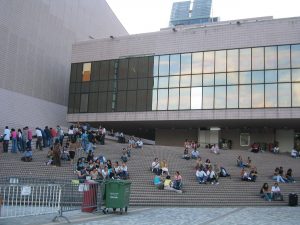A typical Sunday in Hong Kong involves a sea of migrant domestic workers gathering in Central and Victoria Park. That has disappeared since the outbreak of COVID-19 in the city. The number of domestic workers who go out on Sundays, their usual rest day, has dramatically decreased after the Hong Kong government banned gatherings of more than four people in public spaces on March 29. This was part of the effort to combat infections. Persons who still participate in prohibited gatherings could be fined HK$2,000 (around US$260), nearly half of the minimum monthly wage of domestic workers. Many recognize the privilege of being able to work from home. However, the ability to practice social distancing in your own space, without the presence of your boss, is no less important a privilege. For Hong Kong’s 400,000 “live-in” domestic workers, remaining at their employers’ home, where they both work and reside, on their precious one weekly day off poses problems.
Hong Kong’s Labor Department acted quite quickly on news of the spread of a new and deadly coronavirus. In late January, it issued a public notice encouraging domestic workers to stay at home on their rest days to reduce the risk of community transmission. Migrant groups immediately expressed concerns that some employers might take this recommendation as forbidding domestic workers from going out on their days off. Some were also asked to resign if they did not stay at home on their rest day. In March, the Labor Department reiterated their position asking domestic workers to refrain from gathering in public spaces and stay at home on their rest day. Only in early April did the secretary of labor and welfare, Law Chi-kwong, appeal to both workers and employers to “exercise mutual understanding on rest day arrangements” through his blog. Law explained that “we are now at a critical juncture in our fight against COVID-19, and it is essential that all of us practice social distancing to prevent the spread of the disease.”
Sunday is not only about relaxing and social gathering for domestic workers. It is also their only time off to run errands. This includes sending remittances and necessities such as clothes and medicine to their families back home. While most domestic workers are now not going out on Sundays, following official guidance, staying at the workplace (home) with employers could possibly make them feel uncomfortable on their precious only rest day. Under the compulsory “live-in rule” and given the limited home space for a majority of Hong Kong families, most of domestic workers do not have private rooms and often share bedrooms with children or elderly members of the family. NGOs have also found workers being housed in unacceptable conditions such as storage rooms, balconies, bathrooms, or the living room sofa.
From early to mid-March, the Asian Migrants Coordinating Body (AMCB) conducted a survey of 1,127 migrant domestic workers with the support of the Mission for Migrant Workers (MFMW) and the Asia Pacific Mission for Migrants (APMM). The result shows that 25 percent of those who did not go out on their weekly rest day still did some work inside the apartment on their days off.
Another survey of domestic worker employers conducted by pro-establishment legislator Chan Hoi-yan found that 55 percent of employers think that domestic workers have inadequate knowledge and understanding of pandemic prevention. Moreover, 85 percent of respondents preferred that domestic workers stay home during their days off.
The Support Group for Hong Kong Employers with Foreign Domestic Helpers further stated that “helpers are not interested in practicing social distancing and will be happy to flout new rules temporarily banning gatherings of more than four people.” The group added that “some helpers are not concerned about the virus outbreak and they refuse to play their part in stopping it [from] spreading.” The Support Group convener said that “We feel these maids are living in a parallel universe. This is a loophole. They won’t fight this battle with us Hong Kongers together.”
It seems that the pandemic is fueling tension and mistrust between domestic workers and their employers, which could possibly result in ill treatment or even abuse. Due to the explicit power imbalance, workers are often too shy, too embarrassed, and too scared to reject work demands from employers on their rest day. Working in a private household also adds difficulties in monitoring labor conditions. Moreover, emerging data has shown that domestic violence has increased in the context of COVID-19 as security, money, and health worries create tensions and strains accentuated by cramped and confined living conditions. This could also apply to migrant domestic workers who live together with employers in Hong Kong.
The mandatory “live-in” requirement, together with the worsening pandemic situation in Hong Kong, combine to put domestic workers in a more vulnerable, precarious position. Relying on individual employers to self-discipline may be insufficient to protect the labor rights of domestic workers. Apart from unions, NGOs, and social organizations, recruitment agencies, the middlemen between workers and employers, could play a significant part to resolve the tension and mistrust by providing the most up-to-date information and by regularly checking in on the workers’ well-being. In this time of emergency, a transparent grievance mechanism set up recruitment agencies for workers is particularly important to ensure timely response and support. Sadly, this remains lacking in Hong Kong.
Alexandra Chan is a writer from Hong Kong. The views expressed in this article are the author’s alone.

































